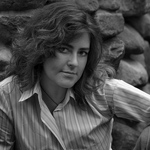| Still Life with Potato Field
Tell me, why is there war
if not to leave buckles in lumps of clay?
The potato field sleeps. At night you can’t imagine
who’ll be lying down in the blue beet tops by morning.
A cold year. The train cars smell
of rubber boots, bodies, and exhalation.
A distant port wanders with ships
and in the crowd its easy to seem a refugee.
Time marches on. The clockface strides
with metal arrows, like a crane in the lagoon.
The bazaars are filled wiht traders,
while cigarette smoke reddens the moon like a sabre.
The house is like a white fish diving into the mist.
It’sbeen a long time since there was light in the window.
At the edge of the field a female figure freezes,
hiding potatoes in the folds of her skirt.
In the leaden air, where there’s no place for lungs
you hear only the clang of a gate’s hasp.
For an instant the face looks out into the night,
then hides its grief behind sticky fingers.
Transl. by Andrew Wachtel
Russian
Натюрморт с картофельным полем
Скажи, на то и есть война,
чтоб оставляла в комьях глины пряжки?
Картофельное поле спит. Во время сна
не угадать, кто в синюю ботву под утро ляжет.
Холодный год. Резиною сапог
пропахли тамбура, дыханьем, телом.
Кочует кораблями дальний порт,
и в толчее людской легко укрыться беглым.
Часы не ждут. Шагает циферблат
металлом стрелок, как в лагуне цапля.
Базары коробейником пестрят,
и месяц рубит папиросный дым, как сабля.
Дом, белорыбицей ныряющий в туман.
Не зажигаются огни в окне подолгу.
У кромки поля замер женский стан,
картофелины прячущий в подоле.
В свинцовом воздухе, где лёгким места нет –
лишь брякнет ржавою щеколдою калитка –
на миг лицо посмотрит ночи вслед
и спрячется в руках от горя липких.
26.0203
« zurück |
![]()
